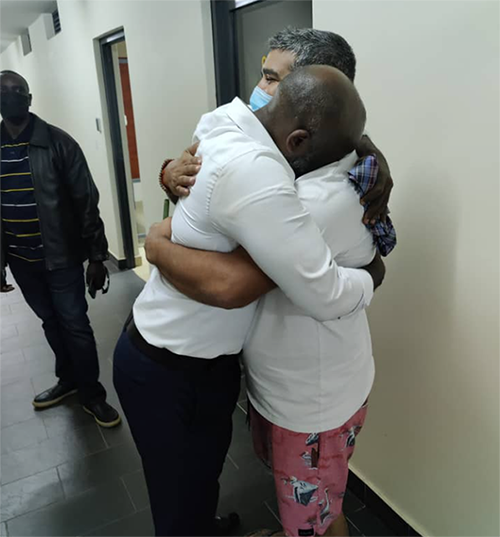Dr. Lawrence Muganga, has Friday night been freed by Chieftaincy of Military Intelligence (CMI) whose operatives had brutally arrested him on Thursday from his office.
The military would explain that his arrest was linked to illegal stay in Uganda and espionage.
It later emerged that Dr Lawrence who was hired to run Victoria University is a citizen of Uganda and possess the country’s national identity card no. CM9603210KCCG.
He is a highly skilled academician who studied from Canada.
Speaking to journalists after his release, Muganga said he was fine and grateful for the the public support.
“I am finally out and thankful for the public support. Thank you Uganda” Dr. Muganga said last night.
Military Spokesperson Col. Ronald Kakurungu said had earlier said that Dr. Muganga had been arrested over illegal stay in the country and espionage activities.
Dr. Muganga who holds a stellar record of success in providing policy advice, independent and analysis, clear and easy-to-read research products has held positions in Canada, Ethiopia, and Rwanda.
He is also skilled at identifying and explaining complex policy and strategy issues and researching contentious issues
He focused on researching, planning, developing, implementing, and assessing policies that contribute towards human capital development and improving the quality of life for populations.
He says he works with universities, think tanks, research and policy institutes, governments, multi-national development agencies, not-forprofit organisations, and corporations.
He is an award-winning writer and author, researcher, educator, international curriculum speaker, public policy practitioner, strategy advisor, development, and management specialist.

Muganga earned his master’s degree in economic policy management from Makerere University and a PhD in educational administration and leadership from the University of Alberta, Canada. He holds a higher education teaching certification from Harvard University, Derek Bok Centre for Teaching and Learning.
He advises schools, governments, multi-national agencies, international aid organisations, education managers, and administrators.
He also supports curriculum development experts, educators, learning facilitators, trainers, and independent citizens searching for solutions to better the education systems, to deliver meaningful learning.
His advice is grounded in the urgent need to equip students with the skills required to address the 21stcentury challenges.





